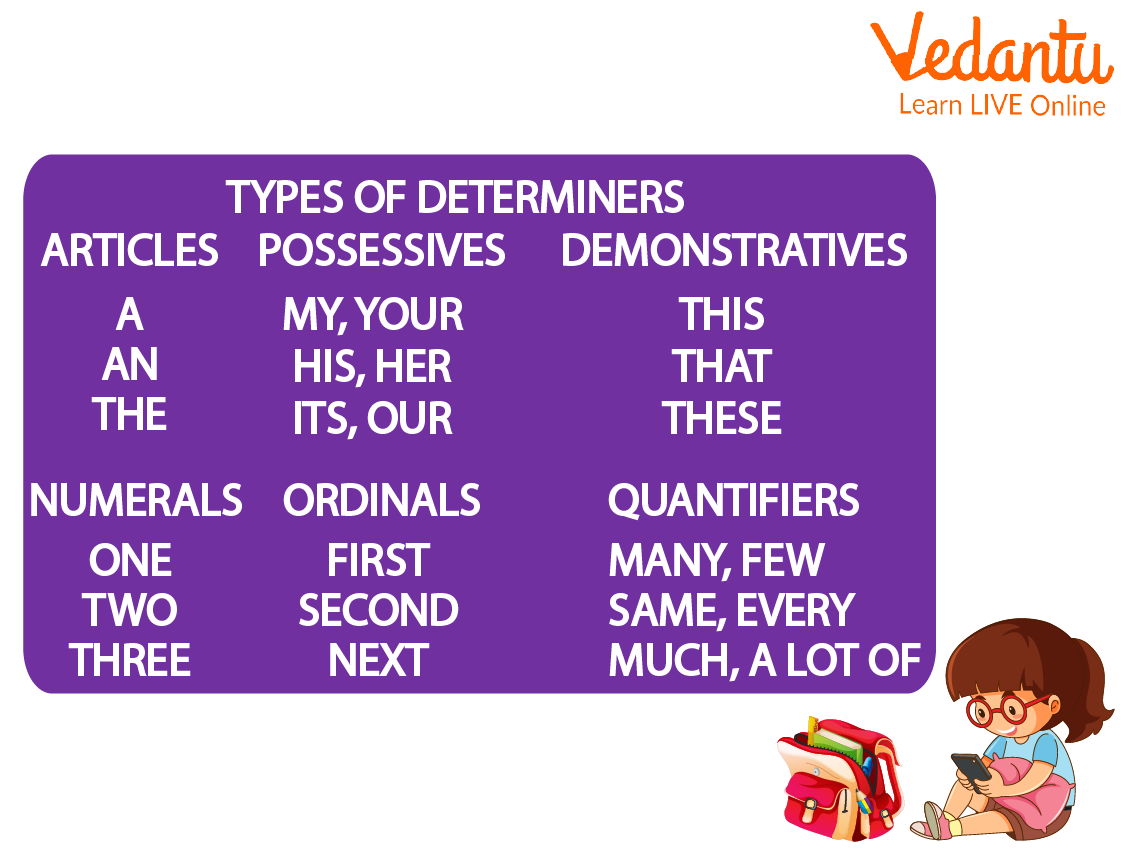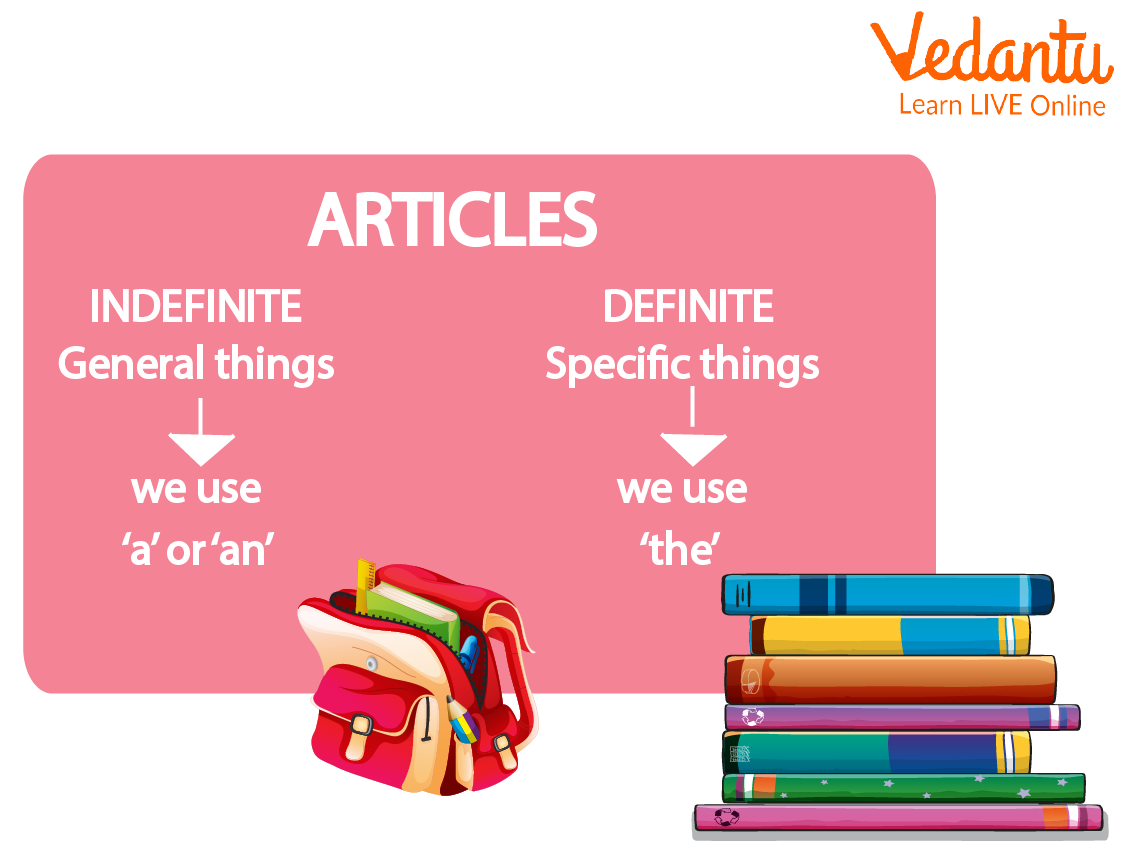Key Determiner Rules and Practice for CBSE Class 9 Exams 2025-26
FAQs on Determiners in Class 9 English Grammar: Concepts, Examples & PDF (2025-26)
1. What types of important questions are asked from Determiners in the CBSE Class 9 English exam for 2025-26?
For the 2025-26 session, important questions on Determiners are typically integrated into the Grammar section through various formats. Students can expect to see them in:
Gap Filling: Where you have to choose the most appropriate determiner to complete a sentence.
Editing/Error Correction: Where a passage is given with errors, and you must identify and correct the incorrect determiner.
MCQs (Multiple Choice Questions): Where you select the correct determiner from a list of options.
Practising gap filling exercises can significantly improve your accuracy for the exam.
2. Which determiners are most frequently tested in Class 9 English exams?
Based on exam trends, the most important determiners for Class 9 are:
Articles (a, an, the): Especially the use of 'the' for specific items and the 'zero article' rule.
Quantifiers (some, any, much, many, few, a few, little, a little): The distinction between countable and uncountable noun usage is a key testing area.
Demonstratives (this, that, these, those): Their correct usage based on proximity and number.
Possessives (my, your, his, her, its, our, their): Ensuring they agree with the subject.
3. How are marks allotted for questions on Determiners in the Class 9 exam?
Determiners are a part of the overall Grammar section, which carries a total weightage of 10 marks as per the latest CBSE pattern. Individual questions, whether in gap-filling or editing tasks, are typically worth one mark each. Therefore, accuracy is crucial as there is no partial marking for these questions. For a detailed breakdown, you can refer to the CBSE Class 9 English Syllabus.
4. Why is the correct use of 'some' and 'any' considered a high-yield topic for important questions?
The 'some' vs 'any' distinction is a classic trap in exams because it tests more than just one rule. While 'some' is generally used in affirmative sentences and 'any' in negative or interrogative sentences, there are crucial exceptions that are frequently tested. For example, 'some' can be used in questions that are offers or requests (e.g., "Would you like some tea?"), and 'any' can be used in affirmative sentences to mean 'it doesn't matter which' (e.g., "You can take any book you like."). Mastering these nuances is key to scoring full marks.
5. What is a common mistake students make with articles ('a', 'an', 'the') in exam questions?
A very common error is the incorrect use of the zero article (i.e., not using any article at all). Students often incorrectly place 'the' before abstract nouns used in a general sense (e.g., writing "The honesty is the best policy" instead of "Honesty is the best policy"). Another frequent mistake is using 'a' or 'an' with uncountable nouns like 'information' or 'advice'. These small errors are precisely what examiners look for in editing tasks.
6. How can I identify and correct a determiner error in an editing task for the Class 9 exam?
To effectively solve an editing task, follow this strategy:
Read the entire sentence to understand its context and meaning.
Identify the noun that the determiner is modifying.
Check for compatibility: Is the noun countable or uncountable? Singular or plural?
Evaluate the determiner: Does it match the noun? For instance, using 'many' with an uncountable noun like 'water' (e.g., "many water") is a common error that should be corrected to 'much water'. You can hone this skill by practising with editing exercises for Class 9.
7. How does understanding the difference between 'few' vs 'a few' and 'little' vs 'a little' help in scoring marks?
This is a high-order thinking skill question often tested in exams. The difference is in connotation:
'Few' and 'Little' have a negative meaning, implying 'not enough' or 'almost none'. (e.g., "He has few friends," meaning he is lonely).
'A Few' and 'A Little' have a positive meaning, implying 'a small but sufficient amount'. (e.g., "He has a few friends," meaning he has some company).
In gap-filling exercises, the context of the sentence (positive or negative) will determine the correct choice, making this a critical concept to master.
8. Where can I find reliable important questions for Class 9 Determiners to prepare for my exams?
For comprehensive preparation, it is best to use a combination of resources. Start by understanding the core concepts on the Class 9 Determiners page. Then, test your knowledge by solving questions from CBSE-aligned sample papers and topic-specific worksheets. This will give you a clear idea of the question patterns and difficulty level you can expect in the actual exam.








































